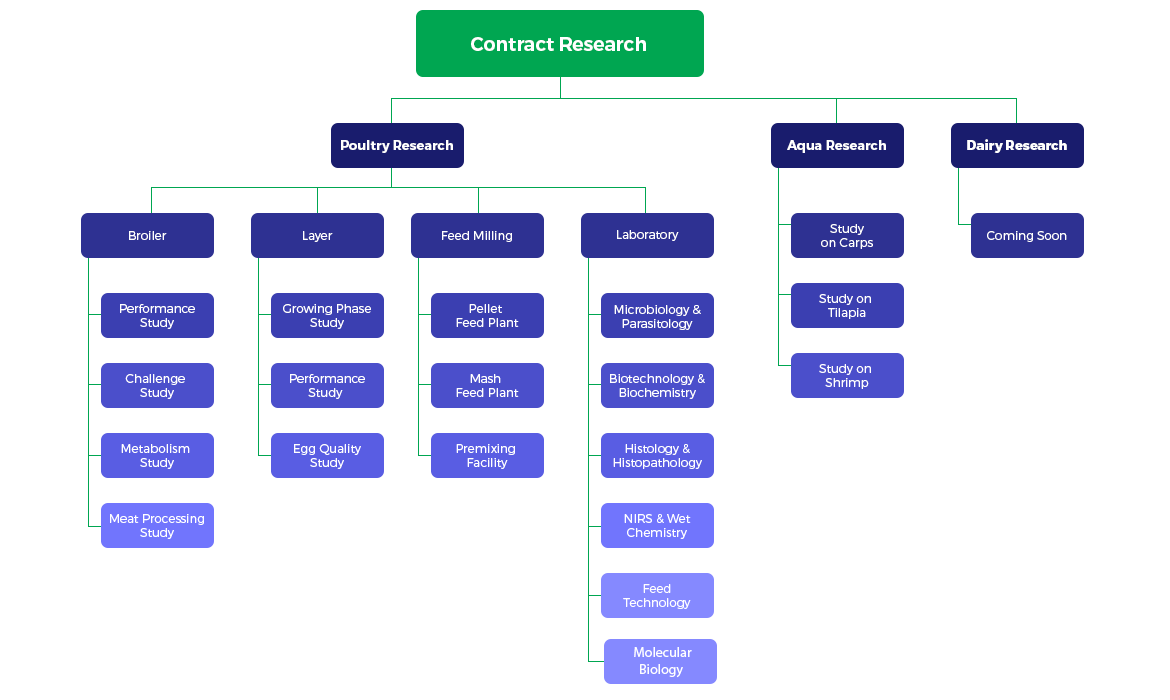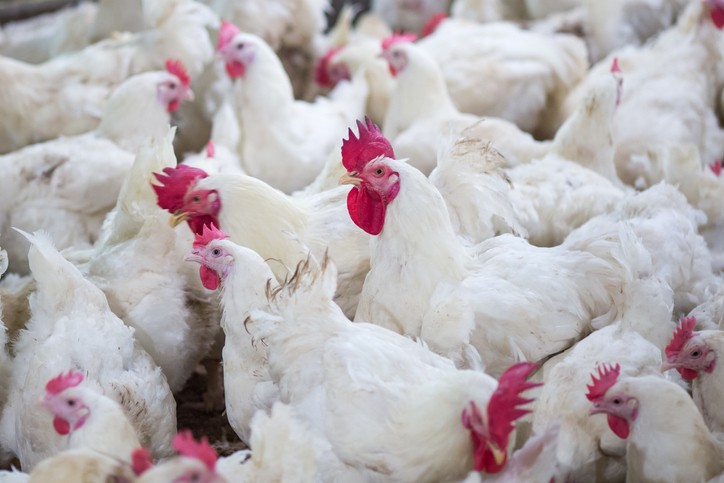


 Poultry Research
Poultry Research
 Performance trait (live weight, feed intake, feed conversion ratio, livability and
productivity index) measurement.
Performance trait (live weight, feed intake, feed conversion ratio, livability and
productivity index) measurement.
 Cost of production and overall economics of production calculation.
Cost of production and overall economics of production calculation.
 Three Broiler Houses with capacity to place 700, 640 and 400 birds.
Three Broiler Houses with capacity to place 700, 640 and 400 birds.
 There are 70, 64 and 40 pens in each shed respectively.
There are 70, 64 and 40 pens in each shed respectively.
 Three Broiler Houses with capacity to place 700, 640 and 400 birds.
Three Broiler Houses with capacity to place 700, 640 and 400 birds.
 There are 70, 64 and 40 pens in each shed respectively.
There are 70, 64 and 40 pens in each shed respectively.

 Broiler Performance Studies:
Broiler Performance Studies:
 Options of conducting trials with straight run or all male flocks are available
Options of conducting trials with straight run or all male flocks are available
 Bias is avoided by adopting completely randomized block designs in:
Bias is avoided by adopting completely randomized block designs in:
 Distributing
chicks within pens
Distributing
chicks within pens  and pens
within a
house
and pens
within a
house Trials are undertaken for raw materials, complete feeds, feed additives, water soluble
medications, vaccines and for breed comparisons.
Trials are undertaken for raw materials, complete feeds, feed additives, water soluble
medications, vaccines and for breed comparisons.
 Poultry Research
Poultry Research
 A metabolism study room having controlled temperature is available for metabolism study.
A metabolism study room having controlled temperature is available for metabolism study.
 The birds are put into specially designed metabolism cages where they are individually fed.
The birds are put into specially designed metabolism cages where they are individually fed.
 The facility can conduct metabolism trials for major nutrients
The facility can conduct metabolism trials for major nutrients
 either by
total
tract apparent digestibility method (faecal collection)
either by
total
tract apparent digestibility method (faecal collection) or by
apparent
ileal digestibility method involving markers (Celite, TiO2 or chromic oxide)
or by
apparent
ileal digestibility method involving markers (Celite, TiO2 or chromic oxide)
 Drinking water is offered individually and is quantified. This facilitates the scope of
water medication studies.
Drinking water is offered individually and is quantified. This facilitates the scope of
water medication studies.
 The Challenge Facility:
The Challenge Facility:
 The objective of this facility is to simulate the actual field conditions in terms of :
The objective of this facility is to simulate the actual field conditions in terms of :
 Environment: Heat or cold stress
Environment: Heat or cold stress
 High
stocking
density
High
stocking
density
 Exposure to
infective agents
Exposure to
infective agents
 A separate complex with 32 pens of similar dimensions is available for such studies.
A separate complex with 32 pens of similar dimensions is available for such studies.
 Pens are completely separated from each other in order to avoid cross contamination and
mixing of the birds/litter materials within the adjoining pens.
Pens are completely separated from each other in order to avoid cross contamination and
mixing of the birds/litter materials within the adjoining pens.
 Designated exclusive workers work in this facility.
Designated exclusive workers work in this facility.
 Equipment to induce thermal stress is available
Equipment to induce thermal stress is available
 Stock culture of Eimeria spp. Clostridium perfringens, Salmonella and Escherichia
coli are available.
Stock culture of Eimeria spp. Clostridium perfringens, Salmonella and Escherichia
coli are available.
 Specific ATCC strains can be arranged if requested for.
Specific ATCC strains can be arranged if requested for.
 A group of poultry veterinarians assesses the load of challenge to be induced and if the
load looks ethically permissible then only challenge studies are undertaken. The main
objective is to abode by the ethical norms of the country and to prevent cruelty on the
experimental birds.
A group of poultry veterinarians assesses the load of challenge to be induced and if the
load looks ethically permissible then only challenge studies are undertaken. The main
objective is to abode by the ethical norms of the country and to prevent cruelty on the
experimental birds.
 Meat Processing Study:
Meat Processing Study:
 Semi-automatic broiler meat processing facility is in operation which measures yields of
dressed meat, internal organs and commercial cuts, chemical composition of meat, drip loss
and water holding capacity as well as cooking loss estimation.
Semi-automatic broiler meat processing facility is in operation which measures yields of
dressed meat, internal organs and commercial cuts, chemical composition of meat, drip loss
and water holding capacity as well as cooking loss estimation.
The details of the parameters which are measured are detailed out in the Agrivet Laboratory section
 Overview of the facility:
Overview of the facility:
 Layer birds are reared at DGN in California cages under open ventilation
system
aided by longitudinally mounted circulatory fans.
Layer birds are reared at DGN in California cages under open ventilation
system
aided by longitudinally mounted circulatory fans.
 Cage dimension: 50 cm x 40 cm” x 40 cm approximately.
Cage dimension: 50 cm x 40 cm” x 40 cm approximately.
 Space allocated per hen: 580 cm2
Space allocated per hen: 580 cm2
 Lighting: Artificial + natural
Lighting: Artificial + natural
 Feed form: mash or crumble whichever fits the study protocol.
Feed form: mash or crumble whichever fits the study protocol.
 Water supply is through nipple drinker.
Water supply is through nipple drinker.
 Parameters studied:
Parameters studied:
 Body weight, feed intake and feed conversion ratio.
Body weight, feed intake and feed conversion ratio.
 Egg production, egg weight and egg mass.
Egg production, egg weight and egg mass.
 Egg grading
Egg grading
 Egg shell thickness and breaking strength.
Egg shell thickness and breaking strength.
 Yolk Colour scoring
Yolk Colour scoring
 Measurement of Haugh unit
Measurement of Haugh unit
The details of the parameters which are measured are detailed out in the Agrivet Laboratory section
 Pelleted feed manufacturing unit (capacity: 100kg/h)
Pelleted feed manufacturing unit (capacity: 100kg/h)
 Mash feed manufacturing unit (capacity: 100kg/h)
Mash feed manufacturing unit (capacity: 100kg/h)
 A precision premixing facility is available where additives in small
quantities are
added into the final batch following progressive dilution technique through
a 6 kg
and 20 kg fine mixer.
A precision premixing facility is available where additives in small
quantities are
added into the final batch following progressive dilution technique through
a 6 kg
and 20 kg fine mixer.
 Vast choice of ingredients to formulate diets as per the need of research is
available.
Vast choice of ingredients to formulate diets as per the need of research is
available.
 Pre-formulation analysis of ingredients for precision matrix correction is
the added
advantage.
Pre-formulation analysis of ingredients for precision matrix correction is
the added
advantage.
 Proximate analysis of every batch of production is done to ensure quality
control.
Proximate analysis of every batch of production is done to ensure quality
control.
 Study of Feed Production parameters:
Study of Feed Production parameters:
 Pelleting parameters
Pelleting parameters
 Pellet
Durability and hardness.
Pellet
Durability and hardness. Particle
size distribution analysis.
Particle
size distribution analysis. Measurement of pelleting throughput.
Measurement of pelleting throughput.
 Measurement of power consumption ampere load, machine efficiency and other
parameters pertaining to pelleting equipment.
Measurement of power consumption ampere load, machine efficiency and other
parameters pertaining to pelleting equipment.
 Agrivet laboratories are operated by competent technicians and are equipped aptly to
provide all the required services related to advanced livestock research.
Agrivet laboratories are operated by competent technicians and are equipped aptly to
provide all the required services related to advanced livestock research.
 The laboratory has the following divisions:
The laboratory has the following divisions:
 Microbiology
Microbiology
 Biotechnology
and Biochemistry
Biotechnology
and Biochemistry  Pathology
and Parasitology
Pathology
and Parasitology NIRS
and
Nutrition Lab
NIRS
and
Nutrition Lab Feed
testing
Feed
testing  Overview of the parameters studied
Overview of the parameters studied
 Raw
material analysis by NIR and wet chemistry.
Raw
material analysis by NIR and wet chemistry. Serum
assay
Serum
assay Histology/Histopathology
of internal organs
Histology/Histopathology
of internal organs Gross
organ morphometry
Gross
organ morphometry Rapid
toxin analysis by ELISA
Rapid
toxin analysis by ELISA  Immunology
and serology
Immunology
and serology  Aqua Research
Aqua Research
 Aqua research facility is located at DGN
Aqua research facility is located at DGN
 Tanks are circular with 400 lit water capacity
Tanks are circular with 400 lit water capacity
 31 individual tanks allow the flexibility to conduct elaborate research
31 individual tanks allow the flexibility to conduct elaborate research
 Following parameters can be generated from Production trials
Following parameters can be generated from Production trials
 Total
biomass
production
Total
biomass
production Feed
conversion efficiency (FCE)
Feed
conversion efficiency (FCE) Average
daily
growth rate per tank
Average
daily
growth rate per tankComing Soon
© Agrivet Research & Advisory . All Rights Reserved | Design & Developed by DITS